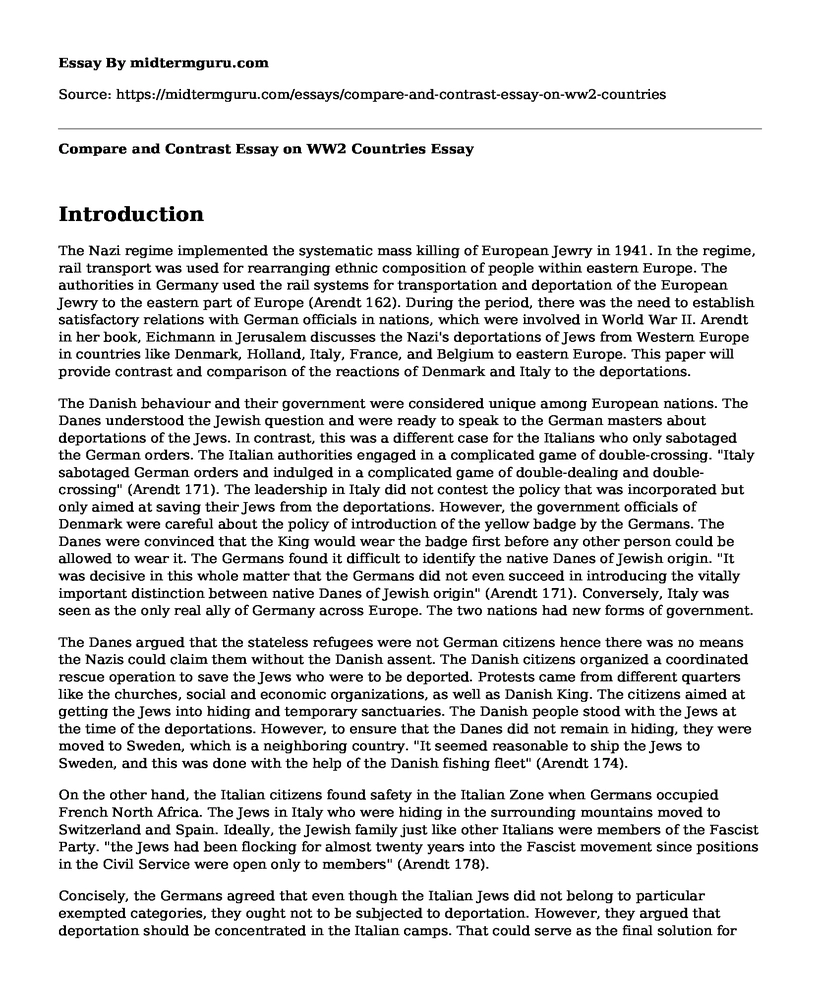Introduction
The Nazi regime implemented the systematic mass killing of European Jewry in 1941. In the regime, rail transport was used for rearranging ethnic composition of people within eastern Europe. The authorities in Germany used the rail systems for transportation and deportation of the European Jewry to the eastern part of Europe (Arendt 162). During the period, there was the need to establish satisfactory relations with German officials in nations, which were involved in World War II. Arendt in her book, Eichmann in Jerusalem discusses the Nazi's deportations of Jews from Western Europe in countries like Denmark, Holland, Italy, France, and Belgium to eastern Europe. This paper will provide contrast and comparison of the reactions of Denmark and Italy to the deportations.
The Danish behaviour and their government were considered unique among European nations. The Danes understood the Jewish question and were ready to speak to the German masters about deportations of the Jews. In contrast, this was a different case for the Italians who only sabotaged the German orders. The Italian authorities engaged in a complicated game of double-crossing. "Italy sabotaged German orders and indulged in a complicated game of double-dealing and double-crossing" (Arendt 171). The leadership in Italy did not contest the policy that was incorporated but only aimed at saving their Jews from the deportations. However, the government officials of Denmark were careful about the policy of introduction of the yellow badge by the Germans. The Danes were convinced that the King would wear the badge first before any other person could be allowed to wear it. The Germans found it difficult to identify the native Danes of Jewish origin. "It was decisive in this whole matter that the Germans did not even succeed in introducing the vitally important distinction between native Danes of Jewish origin" (Arendt 171). Conversely, Italy was seen as the only real ally of Germany across Europe. The two nations had new forms of government.
The Danes argued that the stateless refugees were not German citizens hence there was no means the Nazis could claim them without the Danish assent. The Danish citizens organized a coordinated rescue operation to save the Jews who were to be deported. Protests came from different quarters like the churches, social and economic organizations, as well as Danish King. The citizens aimed at getting the Jews into hiding and temporary sanctuaries. The Danish people stood with the Jews at the time of the deportations. However, to ensure that the Danes did not remain in hiding, they were moved to Sweden, which is a neighboring country. "It seemed reasonable to ship the Jews to Sweden, and this was done with the help of the Danish fishing fleet" (Arendt 174).
On the other hand, the Italian citizens found safety in the Italian Zone when Germans occupied French North Africa. The Jews in Italy who were hiding in the surrounding mountains moved to Switzerland and Spain. Ideally, the Jewish family just like other Italians were members of the Fascist Party. "the Jews had been flocking for almost twenty years into the Fascist movement since positions in the Civil Service were open only to members" (Arendt 178).
Concisely, the Germans agreed that even though the Italian Jews did not belong to particular exempted categories, they ought not to be subjected to deportation. However, they argued that deportation should be concentrated in the Italian camps. That could serve as the final solution for Italy. When Red Army was on their way to Rome, the Germans broke the promise and shipped the Jews from Italy. Contrarily, in Denmark, the Jews were allowed to occupy the camps due to the aspects of political science, as well as comprehension of citizenship requirements. "For the Danes...the Jewish question was a political and not a humanitarian question" (Arendt 179). In essence, Italian humanity was tested by the terror that affected a large population. The Italian officials lacked the zeal to implement anti-Jewish measures that Duce recommended. This forced the office of Eichmann to send out a circular to advise various branches that the Italian Jews would be subjected to necessary measures at one time (Arendt 179). As opposed to the Danish police, the Italian police were not reliable. The old Fascists warned them in time.
Conclusion
During the Holocaust, there were mass deportations of the Jews from different European nations to eastern Europe. Most of the Jews deported were from Denmark, Italy, Greece, France, and Holland. Some of these Jews were forced to hide in mountain regions or seek refuge in neighboring countries to avoid their deportation. The government official and authorities of different nations and the citizens of such nations had varying views and motives about the deportations. The Danish people and the government aimed at protecting the Jews in the country from deportation.
Works Cited
Arendt, Hannah. "Eichmann in Jerusalem: A report on the banality of evil." On Genocide; an anthropological reader. Eds. Alexander Laban Hinton. Oxford; Blackwell Publishing (2002).
Cite this page
Compare and Contrast Essay on WW2 Countries. (2022, Sep 28). Retrieved from https://midtermguru.com/essays/compare-and-contrast-essay-on-ww2-countries
If you are the original author of this essay and no longer wish to have it published on the midtermguru.com website, please click below to request its removal:
- History Essay Sample: The Early Explorers of America
- The Young American Republic - Essay Sample
- Essay Sample on America in the 1780s
- Herodotus Background - Essay Sample
- Teddy Roosevelt: America's Youngest and Most Impactful Leader - Essay Sample
- America Reconstruction: 1865-1877: The Struggle for Meaningful Liberty - Essay Sample
- WWI: Complex Causes, Profound Impact - Essay Sample







